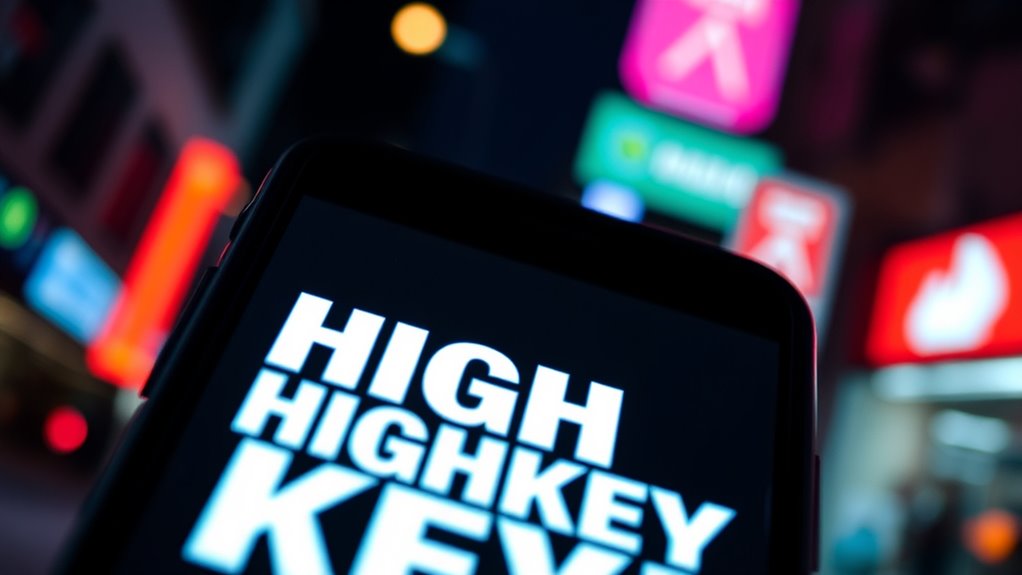In slang, “highkey” means you’re openly expressing strong feelings or opinions without hiding them. It comes from internet slang and African American Vernacular English, emphasizing honesty and authenticity. People use “highkey” to show excitement, agreement, or intensity about something. It’s often contrasted with “lowkey,” which is more subtle or discreet. To get a better understanding of how “highkey” fits into modern conversations and culture, keep exploring further.
Key Takeaways
- “Highkey” is internet slang from AAVE that means openly expressing strong feelings or opinions.
- It indicates honesty, authenticity, or a desire to be transparent about one’s emotions.
- Typically used to emphasize sincerity or intensity in casual conversations and social media.
- Contrasts with “lowkey,” which implies subtlety or keeping feelings discreet.
- The term has gained popularity through social media platforms like TikTok and Twitter.
Origin and Evolution of the Term “Highkey”

Have you ever wondered where the term “highkey” comes from? Its origins are rooted in the slang evolution that’s heavily influenced by internet culture. Originally, “highkey” emerged as a way to emphasize something openly and honestly, contrasting with “lowkey,” which suggests subtlety or hidden feelings. The term gained popularity on social media platforms, especially among Gen Z users, as a way to express strong emotions or opinions without ambiguity. Cultural influence plays a big role here, as slang like “highkey” spreads rapidly through online communities, shaping everyday language. Over time, it’s become a common way to signal authenticity or intensity, reflecting how language adapts to digital communication and youth expression. Additionally, the digital age has accelerated the dissemination of such slang terms across diverse online spaces.
The Difference Between “Highkey” and “Lowkey”

You’ll notice that “highkey” is used to openly share strong feelings or opinions, while “lowkey” keeps things more private or subtle. The terms also differ in intensity, with “highkey” expressing something boldly and “lowkey” staying understated. Context matters, as “highkey” often reveals public sentiments, whereas “lowkey” is reserved for more discreet expressions.
Public vs. Private Expression
Understanding the difference between “highkey” and “lowkey” helps you navigate how people choose to share their feelings publicly or privately. When someone uses “highkey,” they’re emphasizing their feelings through clear public expression—like posting openly on social media or speaking confidently. In contrast, “lowkey” indicates private expression, where feelings are kept more subdued or discreet. Recognizing these differences helps you understand whether someone prefers public expression or private expression, and how they might communicate their emotions. Knowing when someone is “highkey” or “lowkey” helps you respect their comfort levels and social boundaries. Additionally, understanding these terms can improve your communication skills by clarifying social cues and personal boundaries.
Intensity of Feelings
When people use “highkey,” they’re often expressing their feelings with intensity and clarity, leaving no doubt about how strongly they feel. This slang intensity signifies a bold emotional expression that’s impossible to miss. Whether you’re excited, upset, or proud, “highkey” shows your feelings openly. It’s the opposite of “lowkey,” which keeps emotions subdued or private. Here’s a quick comparison:
| Feelings | Highkey | Lowkey |
|---|---|---|
| Emotional Intensity | Very strong, undeniable | Subtle, reserved |
| Expression | Out in the open, unapologetic | Hidden or understated |
| Slang Usage | For obvious, bold feelings | For discreet, quiet feelings |
Using “highkey” signals your emotions are loud and clear, making your emotional expression impossible to ignore. Additionally, understanding the context of test case management can help in accurately conveying your feelings in various situations.
Contextual Usage Differences
The main difference between “highkey” and “lowkey” lies in how openly you reveal your feelings based on the situation. “Highkey” is used when you want to express something clearly and without hesitation, often in contexts where strong emotions are appropriate or expected. Understanding this contextual nuance helps you navigate slang evolution effectively.
- “Highkey” signals your strong desire or excitement in confident situations.
- “Lowkey” suggests subtlety or restraint, often used when you want to keep feelings private.
- The contrast reflects how social settings influence slang usage, highlighting the flexibility of slang in different contexts.
Common Contexts and Usage Examples

Highkey is often used in casual conversations to emphasize something as genuine, obvious, or unhidden. You’ll see it frequently in social media trends, where users want to clearly express their true feelings or opinions. For example, you might say, “I highkey love that song,” to show your strong liking without hesitation. It’s also common in texting or online chats to highlight agreement or excitement, like “That movie was highkey amazing.” The slang’s popularity has grown as more people share their thoughts openly on platforms like TikTok, Twitter, and Instagram. Using highkey helps you communicate sincerity or intensity, making your message stand out. Overall, it’s a simple way to add emphasis and authenticity in everyday digital interactions. Additionally, the rise of online slang like highkey reflects the influence of social media on language and communication styles.
How “Highkey” Reflects Modern Communication Trends

Have you noticed how social media has transformed the way we express ourselves? It’s a prime example of social media linguistics shaping slang evolution. Words like “highkey” now quickly convey emotions and intentions, reflecting a shift toward more direct communication. This trend highlights how digital platforms foster real-time slang creation and adoption.
- Social media accelerates slang adoption, making terms like “highkey” widespread
- It encourages concise, expressive communication over lengthy explanations
- Trends often reflect shared cultural values and attitudes in online communities
Understanding the Cultural Significance of “Highkey”

You should recognize that “highkey” originates from African American Vernacular, where it was used to emphasize honesty and authenticity. When you use “highkey,” you’re expressing genuine intent or strong feelings openly. This cultural background gives “highkey” its significance as a way to communicate sincerity in modern slang. Additionally, understanding sound recording techniques can help capture authentic expressions when recording speakers or performers.
Origins in African American Vernacular
Ever wondered how the term “highkey” found its way into everyday slang? Its origins lie deep in African American Vernacular English (AAVE), where slang adoption plays a essential role in cultural influence. This language style has shaped many modern expressions you hear today.
- The term “highkey” emerged as part of a broader movement to express openness and clarity within AAVE communities.
- Its growth is fueled by social media, spreading these cultural nuances beyond their roots.
- “Highkey” reflects a desire for authentic, unfiltered communication, a hallmark of African American linguistic innovation.
- The popularity of “highkey” is also linked to cultural influence, demonstrating how language evolves through community expression and digital platforms.
Understanding this origin helps you appreciate how slang, like “highkey,” carries cultural significance and showcases the dynamic influence of African American Vernacular on mainstream language.
Expression of Genuine Intent
| Use Case | Example |
|---|---|
| Expressing feelings | “I highkey love this song.” |
| Showing agreement | “Highkey agree with you.” |
| Being serious | “I’m highkey tired today.” |
| Sharing opinions | “Highkey, this movie was amazing.” |
| Clarifying tone | “Just to be clear, highkey excited.” |
Tips for Using “Highkey” in Your Conversations

Wondering how to smoothly incorporate “highkey” into your conversations? To stay current with the slang evolution, it’s important to understand its cultural influence. Using “highkey” effectively can make your language feel fresh and authentic. Here are some tips:
Wondering how to naturally use highkey? Embrace its cultural vibe to keep your slang fresh and authentic.
- Use it to emphasize genuine feelings or opinions, like “I’m highkey excited for the concert.”
- Incorporate it when describing something obvious or intense, such as “She’s highkey obsessed with that new album.”
- Match your tone to the context, ensuring it feels natural, not forced.
The Future of “Highkey” in Slang Language

How do you see “highkey” evolving as slang continues to change? With social media trends constantly shifting, “highkey” is likely to adapt along with other slang terms. As platforms like TikTok and Twitter influence language, “highkey” might become even more mainstream or possibly fade into obscurity, replaced by newer expressions. The slang evolution depends on how users adopt and remix words in everyday conversations and online spaces. You might notice “highkey” gaining more prominence or being used in different contexts to emphasize sincerity or intensity. Its future hinges on how well it resonates with emerging social media trends and how users continue to redefine what’s cool or relevant. Keep an eye on digital culture—slang like “highkey” can change faster than you think. Additionally, language trends help us understand how slang terms like “highkey” become popular or fall out of favor over time.
Frequently Asked Questions
How Did “Highkey” Become Popular Among Gen Z?
You’ve probably noticed “highkey” became popular among Gen Z through the evolution of slang and digital communication trends. As social media platforms like TikTok and Twitter grew, slang spread quickly, making “highkey” a way to emphasize honesty or intensity. You often see it used in casual chats, memes, and videos, reflecting Gen Z’s desire for authentic expression. Its rapid adoption shows how digital trends shape language fast today.
Are There Any Regional Differences in Using “Highkey”?
You might notice regional differences in using “highkey,” as its popularity varies across cultural contexts. In some areas, people use it more casually to emphasize something, while in others, it might sound more trendy or niche. These regional variations influence how comfortably you can incorporate “highkey” into conversations, reflecting local slang trends. Overall, understanding your cultural context helps you use “highkey” appropriately and confidently.
Can “Highkey” Be Used in Formal or Professional Settings?
You probably won’t find “highkey” suitable in formal or professional settings, as it’s mainly slang. Studies show that only 5% of workplaces encourage casual language, and slang like “highkey” can seem unprofessional. In a formal context, stick to clear, precise language. Using “highkey” might confuse colleagues or clients, so it’s best to reserve it for casual conversations with friends or on social media where slang is more accepted.
How Does “Highkey” Compare to Similar Slang Like “Seriously” or “Really”?
You’ll find that “highkey” offers a subtle emphasis and a casual tone, making it stronger than “seriously” or “really.” When you say something is “highkey,” you’re openly expressing your genuine feelings or opinions without much doubt. Unlike “seriously” or “really,” which can sometimes sound more neutral or unsure, “highkey” makes your emphasis clear and confident, perfect for informal conversations where you want your meaning to stand out.
What Are Common Mistakes People Make When Using “Highkey”?
When you overuse “highkey,” you risk sounding repetitive or overly intense. Many people misusing “highkey” mistakenly place it in every sentence, which can dilute its impact and confuse your message. To avoid this, use “highkey” sparingly to emphasize genuine feelings or important points. Remember, overusing “highkey” makes it less special and can make your communication seem exaggerated or insincere.
Conclusion
So, now you’re armed with the scoop on “highkey,” ready to sprinkle it into your chats like a slang connoisseur. Just remember, using it might make you sound cool—unless you overdo it, then you’re just “highkey” trying too hard. But hey, if you want to impress your friends or confuse your grandma, go ahead and drop “highkey” with confidence. After all, who needs subtlety when you’ve got slang?









